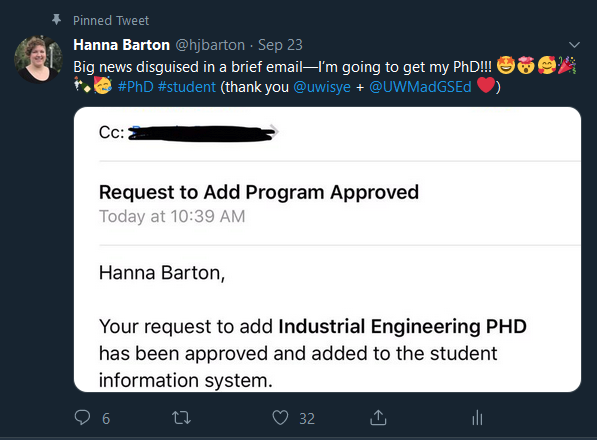
In honor of my recent acceptance into UW – Madison’s Industrial and Systems Engineering Department’s Doctor of Philosophy program, I’m embarking on writing a series of articles on Human Factors Engineering and its applications. My intention with this series is to share with you:
- What Human Factors Engineering (HFE) is
- The many ways HFE influences the world around us
- How HFE can be leveraged to create safety, productivity, and joy
- How HFE is being used in specific contexts, particularly health care
- And more…
So stay tuned for more content from my brain! For now, I will leave you with my vision for the future.
PhD Application Personal Statement
Hanna Barton | September 14th, 2019
The future is calling for new and innovative health service design and delivery structures. Since the Institute of Medicine’s (IOM) landmark reports, To Err is Human and Crossing the Quality Chasm, were published in 2000 and 2001 the field of Health Systems Engineering has been growing. So much so, that the National Academy of Engineers (NAE) has come together with the IOM in Building a Better Delivery System with a charge to engineers to apply their time-honored tools to the behemoth struggles we face in healthcare.
I would like to answer that call. There is no better work for me to do with my life than to develop systems and structures that provide people with optimal health: ones that really work for people, with no one left out. Continuing on from my Master’s degree program to conduct research and earn a PhD here at the University of Wisconsin – Madison is the next step to prepare me to make this difference.
I became an engineer because I saw that, while noble to pursue knowledge for its own sake, I am driven to integrate it to make change, to build and to design with it. Through my Biomedical Engineering coursework, I fell in love with the design process—the way people of varied backgrounds and expertise could come together to create something that hasn’t existed before but exactly what’s required. By iterative design experience, I saw firsthand the value that team members, including myself, brought when we applied new mindsets to engineering design, be they public health or gender and women’s studies viewpoints.
During my accelerated Master’s program, I’ve had the chance to take a cross-sectional view of healthcare, completing courses in the law and business schools this past semester. The luckiest moment of them all may have come, though, in an Industrial and Systems Engineering course when Dr. Nicole Werner approached me about working in her lab for the summer. My experience working with Dr. Werner inspired me to broaden my perception of what could be accomplished in academia. I am drawn to Werner lab because it runs the full continuum from conducting qualitative research (visiting and interviewing people and distinguishing emerging concepts from the transcripts), to theorizing and publishing about those concepts, to conducting participatory design sessions and developing design recommendations for assistive technology, to ultimately building, implementing, and testing those technologies.
My intention is that my research as a PhD student will bring together many of my passions and talents—including my 1) fascination with design, design thinking, and participatory design work, 2) commitment to serving historically marginalized or under-served communities, 3) love for inter-disciplinary, collaborative work, 4) focus on global perspectives and implications and 5) excitement about seeing projects realized and implemented in the world.
There is so much meaningful work to be done in healthcare (and in health and well-being more broadly) that will require a distinct mindset. And while health care providers are essential to health and wellness, a new kind of healthcare workforce is warranted—one of collaborative effort between experts in policy, data science, clinical care, and human factors and systems engineering. Human Factors engineering is uniquely situated to inform the design and implementation of systems and technologies that holistically support people’s truest intentions—leaving people healthier, happier, more satisfied and productive.